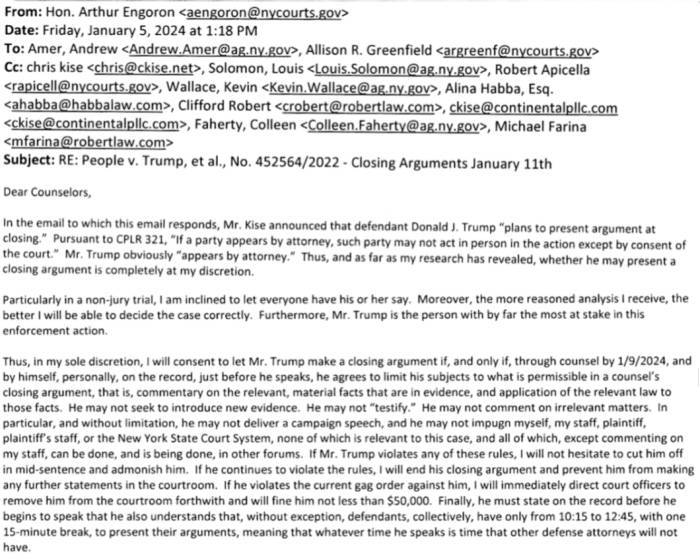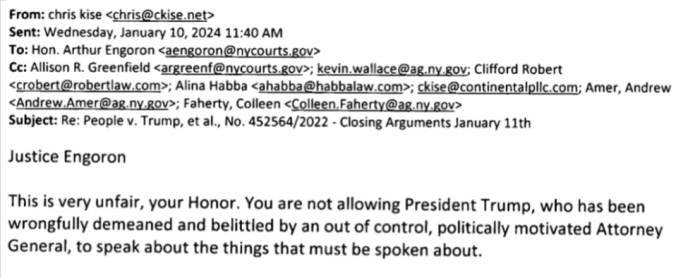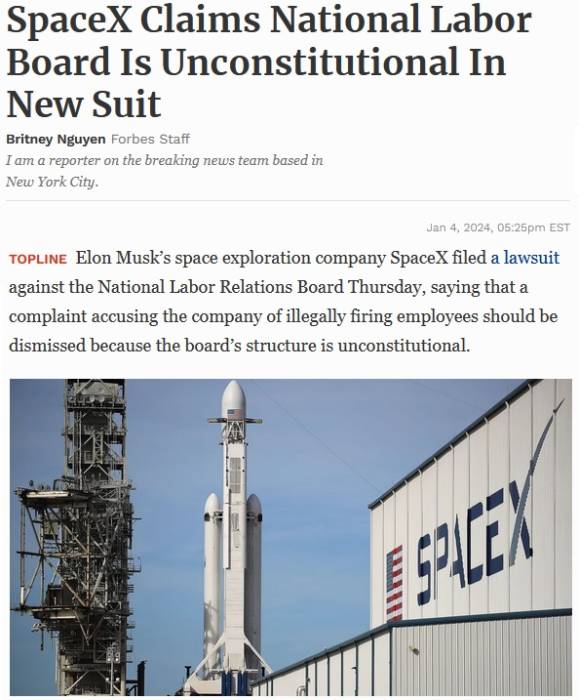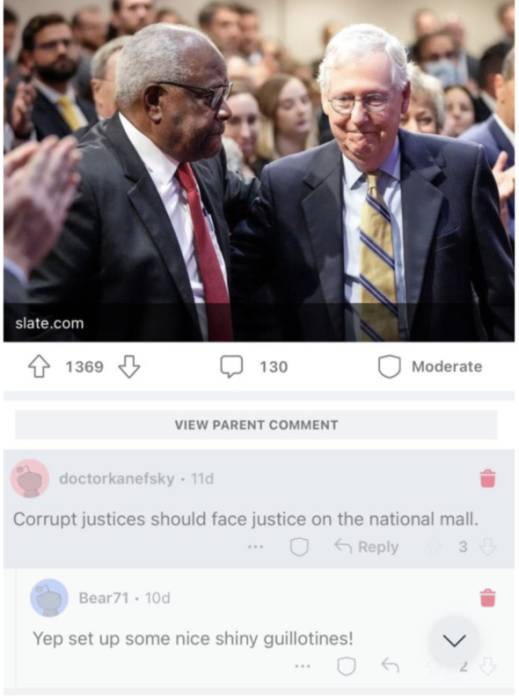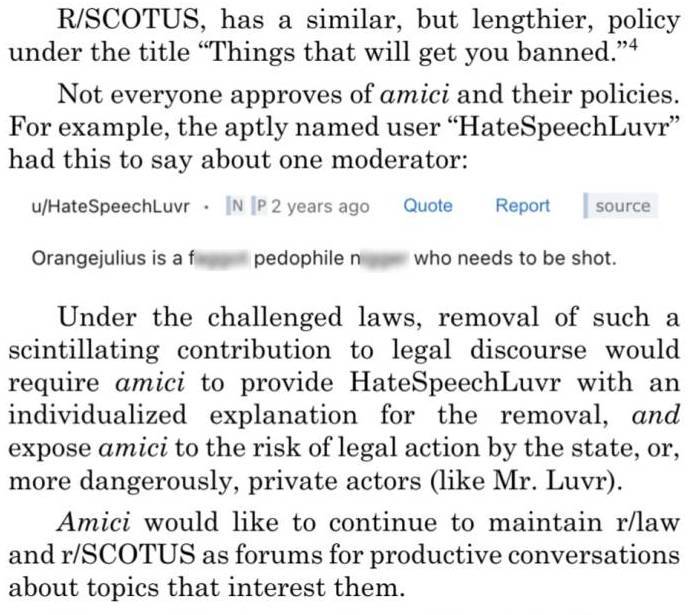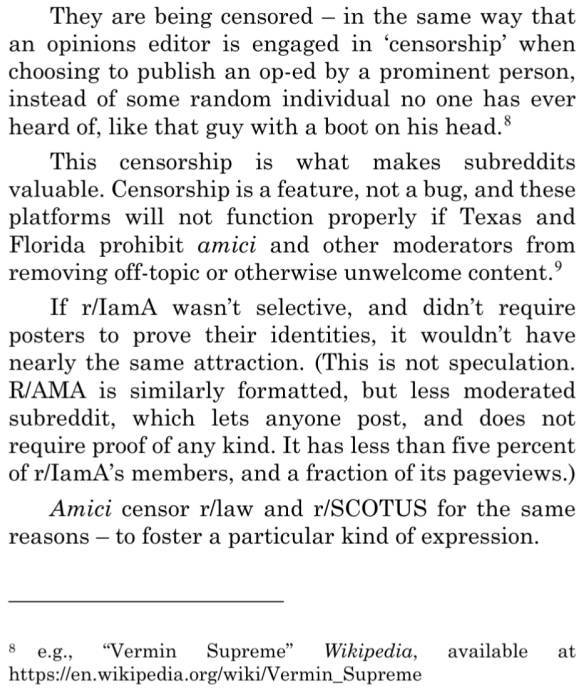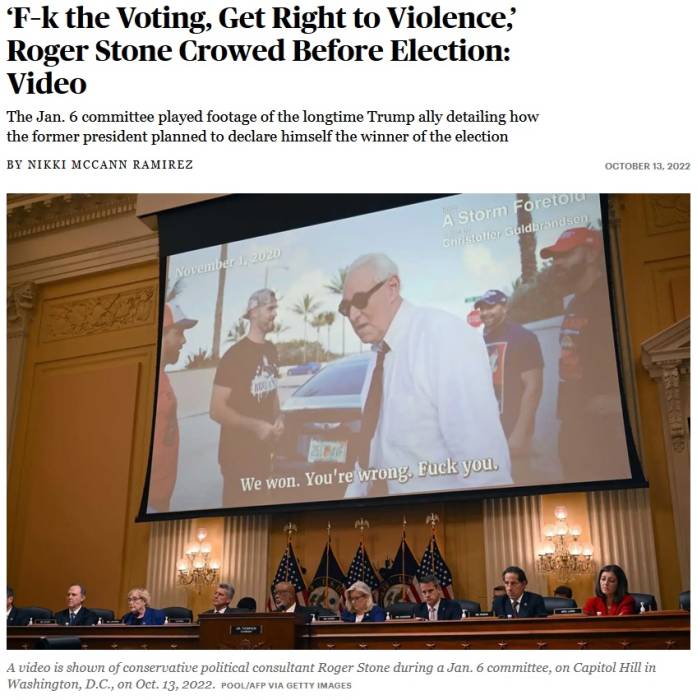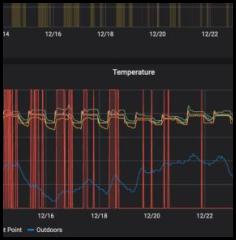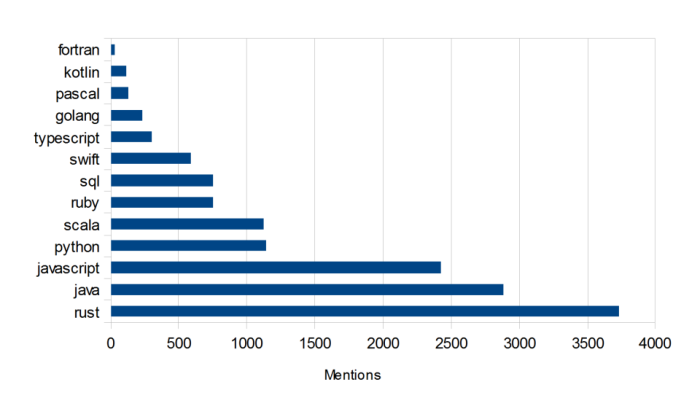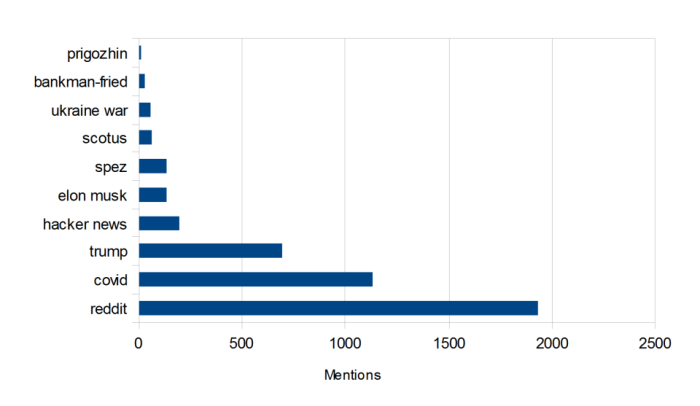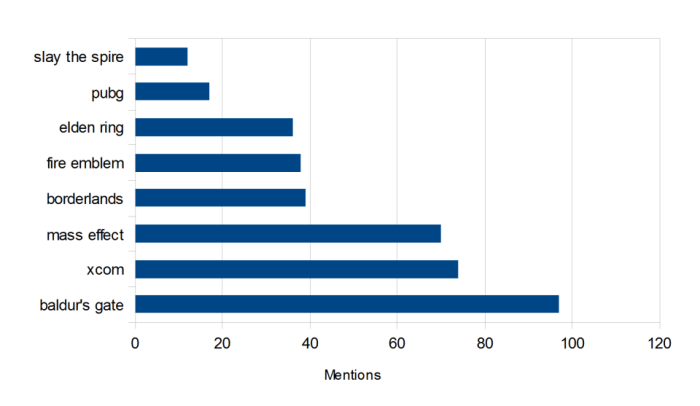The best thing on tv right now is probably
the half-dozen trials and Supreme Court cases that have been rotating through the news. Mystery, drama, comedy, deception - it's all there.
In case you want to skip ahead:
- New York v. Trump: the fraud trial wraps up with a weird email chain between the judge and attorneys.
- SEC v. Jarkesy: the battle against administrative justice goes to spaaace.
- Moore v. United States: will I get a tax credit for unrealized losses in my port?
- Moody v. NetChoice: some Reddit mods file an amicus describing a day in the life of an internet janitor.
- Georgia v. Trump: why it's important to pay attention in mandatory trainings.
- Trump v. Anderson: Colorado sends its regards.
- United States v. Trump: bigly immunity.
New York v. Trump: "Per my last email..."
Let's start with the New York civil trial against the former president for, among other things, claiming his 10,000 sq ft apartment was 30,000 sq ft.
Deceptive bookkeeping isn't normally all that interesting but this one has created its own intrigue.
- The defense has been run like a political campaign: grandstanding, attacking opponents, attacking moderators. Pundits have been quick to say this is to drum up votes and donations. While probably true, it's worth noting that - as Alan Dershowitz said - this legal strategy is probably intended to antagonize the judge into making an error that could lead to a reversal on appeal. We're seeing is a model of defensive synergies that may be employed elsewhere.
- Questions of free speech and prior restraint have come up as the judge has attempted to shield his staff from the circus.
- The defense (and a PAC) paid an expert witness nearly a million dollars to say that he found no fraud in Trump's books. This is after the determination of fraud had been made.
- Trump was going to testify but backed out when his lawyers couldn't get the judge's gag order overturned on appeal.
Closing arguments are tomorrow and
the defense asked that Trump be allowed to speak. The court published the
email thread and it is kind of a trainwreck.
After some back and forth about whether the former president would be able to ramble about the deep state in his part of the closing, his attorney asked for a delay due to the death of Trump's mother in law. (It might be worth noting Trump did a nationally-televised town hall tonight.) When Engeron denied the request, the tone and phrasing that "Kise" used abruptly changes to something more familiar:
SEC v. Jarkesy & Elon v. NLRB
In December
we talked about SEC v. Jarkesy, an ongoing Supreme Court case wherein a hedge fund fraudster sued the SEC over the constitutionality of administrative justice. Since the SEC isn't the only place that practices administrative justice, there as been some concern that
SCOTUS would take the opportunity to drastically reshape government.
Apparently Elon
"Tell that to Earth" Musk caught wind of this and decided that
SpaceX (the corporate person), too, was denied proper Article III justice by the National Labor Relations Board.
Moore v. United States: unrealized tendies
Weirdly, just as Elizabeth Warren is pushing for a wealth tax the Supreme Court is going to tackle
the issue of whether or not unrealized gains can be taxed. Senator Warren is concerned about the Elon Musks of the world
living tax-free off of loans against their assets. Investors (myself included) were initially alarmed that we'd have to start paying Uncle Sam for gains on positions from which we haven't taken profit. I vaguely recall that Warren's plan wouldn't hit retail investors but nobody reads past the headlines.
Anyway, here's something from the WSB discussion:
 yumcake yumcake |
Taxes are whatever the legislative/judicial system makes them out to be. They typically don't tax unrealized gains because the idea is that if there's no cash realized, there's no cash that can be turned over to pay the tax. For example a famous painting gains 1mio in value, but you can't pay taxes on that by cutting pieces of the art off and mailing it to the IRS.
HOWEVER, if someone is turning those gains into loans, they are not only receiving a benefit, but also cash, and mechanically there's no reason that cash realization can't be taxed. It hasn't been done because the cash is paired with an offsetting liability that in theory nets out the benefit. That's just the theory around it though...
If the reality is that the rich can just avoid ever "realizing" capital gains and just perpetually taking out loans and spending the loaned cash and just perpetually rolling the loans forward...then you've got a system where they don't need to pay taxes. Even if they do eventually need to pay the loan, they've delayed paying taxes for a long time and the time value of the money they've delayed paying is a huge benefit.
Hence the need to design a plug for the loophole. Obviously, they'd need to not be stupid in designing unintended consequences into it. You do not want to just put a tax on loans, that would be absolutely idiotic because of the massive suppression it would have on businesses that legitimately need loans to get started or get running.
|
Moody v. NetChoice, LLC
The Moody thing seems
too straightforward to write about: can web forums delete user posts? Well yeah, obviously.
On the other hand, the question found its way to the US Supreme Court and they decided to hear it. I didn't dig into the arguments on either side and won't recite them here, rather,
I found my way to Moody by way of the amicus brief written by the moderators of /r/law/ and /r/scotus (hereafter referred to as "the mods"). It reminded me of the compelling and entertaining
amicus that The Onion wrote in support of satire last year.
To provide some background, here's the Wikipedia summary of
Moody:
 Wikipedia
Wikipedia |
In September 2021, Texas passed Texas House Bill 20, a law that would govern the behavior, particularly with regard to content moderation, of social media companies with more than 50 million users. Among other provisions, the law forbade platforms from "censoring" (defined as essentially any mechanism by which content is removed or hidden) user content based on viewpoint, barred email providers from impeding the transmission of emails under most circumstances (except where the content is obscene, illegal, or contains malicious code), and required platforms provide detailed transparency reports and information about their content moderation policies.
|
I can't imagine a world where
web forums would be helpless against trolls and spammers, particularly in the GPT era. The internet is chaotic enough when its janitors have total discretion. The Reddit mods couldn't envision that hypothetical either, so they supplied the Supreme Court with a few examples of content that they deal with on the daily.
The last sentence (about suing the mods) escaped my single-sentence summary and brief Wikipedia blurb. Apparently Texas and Florida laws could be used against community members that wield moderation authority, not just Silicon Valley megacorps.
 The Mods
The Mods |
If the Attorney General of Texas (who has not been treated kindly by the subreddits' users) decides that the moderation policies of r/law and r/SCOTUS (or r/Texas) violate HB20, he doesn't need to sue Reddit Inc. (the California based, multi-billion-dollar corporation that owns and operates Reddit). Instead, he is empowered to bring an action against the moderators to enforce compliance. In fact, the statute is broadly enough worded that the Attorney General could bring an action for an injunction requiring all ISPs in Texas to block the 'offending' SMP (which is the only way that HB20 could be enforced against foreign or decentralized SMPs), creating Texas's own version of China's Great Firewall. (All, of course, in the name of "protecting" speech, and "chilling" censorship.)
|
"The Internet interprets censorship as damage and routes around it."
 The Mods
The Mods |
Former president Trump got kicked off Twitter, so he went and started his own SMP called "Truth Social," where he gets to decide who gets published, and who gets deplatformed. [Footnote: Which has so few users that it wouldn't be subject to either of the challenged laws.]
The system works!
That wasn't sarcasm. Trump didn't like how he was treated on Twitter, so he created Truth Social. Now, there is one more SMP for users to choose from. There is more speech, on more platforms, not less. And all because of the "censorship" that so frightens Florida, Texas, and the Fifth Circuit.
|
This unfortunately leads to hyperpartisan echo chambers, but the solution probably isn't to turn every forum into a free for all.
The museum of Reddit
 The Mods
The Mods |
Less prominent and wealthy individuals have the same option. Making websites is easy, cheap and (for the time being) requires no special government permits.
This is not mere speculation. R/The_Donald was once a popular subreddit (with more than 800,000 members) devoted to promoting the former president, whom they, with increasingly alarming sincerity, called the "God Emperor of the United States." Eventually, Reddit Inc. chose to shut it down entirely due to its members' bigotry and repeated calls for violence.
Instead of being silenced, a large section of r/The_Donald's userbase migrated to a new SMP, 'TheDonald.Win', where they continued expressing themselves freely until the website's owner and creator shut it down in the wake of the January 6 capitol attack
The community then moved to a third site, Patriots.win, which is still operational. Its top post of all time is the former president's tweet calling for a "big protest" in DC on January 6, 2021. The top comment on that post is: "Well, shit. We've got marching orders, frens."
|
Ah yes, long before
the Reddit blackout, CEO /u/spez won widespread criticism by defending the existence of /r/the_donald, describing it as "valuable conversation". He also managed to alienate the t_d users by stealth-editing a user comment as a joke but, alas, that user base only knows how to be victims of oppression.
Anyway, the mods are right,
no one on the internet will ever be silenced because there's always a place to speak your mind.
Editorial discretion
In making their argument to retain banhammer authority, the mods chose humorous examples or ones relevant to other issues on SCOTUS's plate. Totally worth the read.
Fifth Circuit
Moving on from the moderator amicus,
I couldn't imagine how this ended up at the Supreme Court. Sure, I could see Texas and Florida passing these laws and I'm aware of the Fifth Circuit's reputation, but in what world can major websites not moderate the content they host? And for that matter, if this is a 1A issue, why would small websites be excluded?
The mods' amicus purposefully left questions of law to better-qualified voices and instead focused on what real life content moderation looks like. That left me at a loss as to how
Moody bubbled up to the Roberts court, perhaps on the back of some reality-detached thing like drawing an analogy between the internet and a shopping mall.
 Politico
Politico |
"Today we reject the idea that corporations have a freewheeling First Amendment right to censor what people say," Andrew Oldham, a Donald Trump appointee who had previously served as Abbott's general counsel, wrote in the 5th Circuit's decision.
|
As someone who has - from time to time - used the internet,
I'd more readily apply the term 'freewheeling' to internet trolls than the people who move their comments to the wastebin. I guess Judge Oldham and I may disagree on some things.
Using the media synopsis I dipped a toe into the lower court's
Moody decision but didn't find anything especially illuminating. I did see selected
quotes from the Fifth Circuit that dripped with enough condescension that I had to go a little deeper. Alas, while I've happily read SCOTUS oral arguments and the occasional decision, the 100+ page Fifth Circuit
Moody decision wasn't happening for me. I skimmed some of it and found plenty of galling passages.
 Fifth Circuit Court of Appeals
Fifth Circuit Court of Appeals |
The Platforms are nothing like the newspaper in Miami Herald. Unlike newspapers, the Platforms exercise virtually no editorial control or judgment. The Platforms use algorithms to screen out certain obscene and spam-related content. And then virtually everything else is just posted to the Platform with zero editorial control or judgment. "Something well north of 99% of th[is] content . . . never gets reviewed further. The content on a site is, to that extent, invisible to the [Platform]."
|
It seems like the mods would, by their very existence, beg to differ. And any other community moderator on the more mainstream social media platforms.
I wondered about the
newspaper editorial analogy:
 Fifth Circuit Court of Appeals
Fifth Circuit Court of Appeals |
Our esteemed colleague in dissent suggests that the timing of the Platforms' censorship doesn't matter because censorship decisions "can only be made, as a practical matter, after the appearance of the content on the Platform." The dissent's factual premise is incorrect: Online platforms can and do moderate submissions before transmitting them. For example, the New York Times moderates online comments on its articles before posting them. That's arguably the same form of ex antecuration that newspapers use for other material they publish and that enjoys constitutional protection under Miami Herald. If the Platforms wanted the same protections, they could've used the same ex antecuration process. Early online forums and message boards often preapproved all submissions before transmission. See, e.g., Stratton Oakmont, Inc. v. Prodigy Servs. Co. (noting Prodigy's early policy of "manually reviewing all messages prior to posting"). Later on, the Platforms made a judgment that jettisoning editorial discretion to allow instantaneous transmission would make their Platforms more popular, scalable, and commercially successful. The Platforms thus disclaimed ex antecuration-precisely because they wanted users to speak without editorial interference. That decision has consequences. And it reinforces that the users are speaking, not the Platforms.
|
I'd have to read the whole thing to be sure, but
it certainly seems like the Fifth Circuit does a lot of cherry picking in its selection of examples of content moderation. While some early platforms may have had manual comment review on high profile pages, it was not the norm and definitely not a thing in chat rooms. I can see NYT curating their comments section like editorials, at great cost. Many, many more newspaper platforms integrate with Facebook or some other service to manage comments with normal moderation tools.
This at least paints a picture of the future of internet forums should SCOTUS agree with the Fifth Circuit.
Comments will all require review before publishing and platforms beyond the reach of US courts will thrive. Good for Bytedance.
Oh, and I
guess comment edits are out. Otherwise I could post, "Lovely day today" and have it approved, then change it to say something that would make /u/HateSpeechLuvr blush and if mods took it down it would be a violation of my First Amendment rights.
 Fifth Circuit Court of Appeals
Fifth Circuit Court of Appeals |
Accordingly, the Platforms cannot invoke "editorial discretion" as if uttering some sort of First Amendment talisman to protect their censorship.
|
This... this strikes me as an extremely unprofessional way to disagree with someone. Particularly when
it's difficult to dispute that the platforms are publishing content and that publishing content has always involved finite resources and editorial discretion. Even 4chan.
Maybe the opinion is much shorter if you take out the redundancy? Regardless,
is "shouting editorial discretion" the entirety of the argument put forth by the coalition of platforms? It's probably not, considering the Fifth Circuit ranted for a hundred pages in response.
 Fifth Circuit Court of Appeals
Fifth Circuit Court of Appeals |
First, the Platforms have virtually unlimited space for speech, so Section 7's hosting requirement does nothing to prohibit the Platforms from saying what they want to say. Contrariwise, both Miami Herald and PG&E involved "forum[s] of inherently limited scope"-a newspaper and newsletter with significant space constraints.
|
Alas, while platforms do have a lot of storage space, users of the platforms cannot view the entire site at a glance. And so
web communities more resemble newsletters from a practical standpoint, since it's hard to carry on a discussion about vehicle restoration when every other comment is pumping a cryptocurrency or whining about "the steal".
Perhaps these platforms could retain all comments but redirect policy-violating ones to a visible-but-obscured dungeon? Alas, the Texas law forbids using editorial discretion to obscure posts that are abusive or off-topic.
 Fifth Circuit Court of Appeals
Fifth Circuit Court of Appeals |
Second, the Platforms are free to say whatever they want to distance themselves from the speech they host. The Supreme Court has been very careful to limit forced-affiliation claims by speech hosts.
|
Well I guess one solution to having rants, ads, and flamewars crowd out legitimate discussion is to
let the platforms surround each shitpost with a disclaimer. For casual viewers it'll make web forums incomprehensible while enthusiasts will write browser plugins to do filtering on the client side.
I have to assume the Fifth Circuit at some point acknowledges that the censored speech is comprised of more than just "Texan values that offend Silicon Valley's woke feefees". But
every quote I came across seems to assume the moderated content has value and relevance.
Back to the mods for the last word
Toward the end of the amicus they stopped pulling punches:
 The Mods
The Mods |
This is the horrible beauty of the internet. True censorship is impossible. Any speaker or community kicked off one platform can find or build a new one with ease.
What you can't get easily is an audience. For that, you need to build a platform that people want to use or create content they want to look at.
And that's what these laws are really about: eyeballs, audiences, and reach. As the name suggests, social media platforms make great bully-pulpits. These laws are not about protecting speech.
They're about politicians ensuring that a favored constituency has access to someone else's megaphone to spread a message that only SMPs with many millions of users are targeted by these laws reinforces the point: if the state aims to compel publication of favored speech, it is natural to target The New York Times instead of a neighborhood newsletter.
To strip away all veneers: the far-right wing of the electorate feels like it can't compete in the marketplace of ideas, because it keeps getting kicked off the most popular websites for saying things that offend the operators, other users, or worst of all, the advertisers.
In two states where that delightfully illiterate-yet-verbose constituency has a lot of political power, it has lobbied for laws that would force others to subsidize and facilitate its message.
The First Amendment cannot, and does not, permit that. Racist nazi trolls are free to follow Mr. Trump's example and start their own forums. They are not free to take over and destroy the forums that amici and others have built up through years of work.
|
Georgia v. Trump: now a trainwreck
I haven't paid much attention to Georgia v. Trump, the one about the "perfect phone call" and fake electors. First, it seems a bit chaotic. There are
quite a few co-defendents that were originally going to be tried together - some have been servered since then - and there have been efforts to remove the trial to federal court. So by all rights, this would be the slow horse in the race compared to, say, a rather straightforward classified documents prosecution. Second, it seems like the justice system has to
simply go through the motions to answer the question on the meaning of, "find me votes" when said after votes have been counted. I don't see twelve jurors not coming to the same conclusion, particularly with the handful of defendants that turned state's evidence.
So while I didn't find this (pre-)trial especially captivating, it's suddenly taken a turn for the worse. Last week there were rumblings about disclosures and
a subpoena in divorce proceedings related to one of a few outside lawyers retained by District Attorney Fani Willis. It initially seemed like another salvo of political attacks but according to attorney and legal analyst
Ken White, this wasn't from a muckraker. And so today [
Ed: Jan 15, this was a multiday post]
Willis addressed the allegations in a weird way. She took issue with the fact that her relationship with just one of the prosecutors would be targeted, described herself as 'flawed', and didn't acknowledge or deny the nature of the semi-accusation.
In an ideal world the accusations are nonsense, District Attorney Willis has no obligation to deny baseless insinuations, and perhaps the 'flawed' comment was related to the the venue being a place of worship. In the context of a political campaign it wouldn't be abnormal to simply ignore the mudslinging, but
this isn't an accuasation from a political rival, it's now part of the legal proceedings:
 The Hill
The Hill |
[Defendant Mike Roman] claimed in court filings Monday that Willis and a top prosecutor in the case are engaged in an "improper" romantic relationship, making the indictment "fatally defective."
|
And since answering the allegation is going to happen sometime, today might have been a good opportunity to do it. Now,
nobody should care about the District Attorney's private life but absolutely every public servant has conflict of interest obligations when they're disbursing public funds. Well maybe not in Florida, but everyone else does.
Is this fatal to Georgia v. Trump?
Obviously I have no idea but from what I've read the answer is
"probably yes but for different reasons". The "fatally defective" argument is legitimate but rests on the defense proving more or less that Willis's prosecution was fundamentally corrupt. Unless the charges against Trump et al were brought as a way to funnel money to the Nathan Wade (they weren't), Roman's claim isn't going to fly. In the likely-sounding scenario where the District Attorney has to step down,
Ken White says the prosecution might get transferred to another entity in Georgia that has a reputation for being political. I'm not sure why the DA couldn't hand things off to a lieutentant - maybe she can - otherwise the slow horse trial is probably going to get a lot slower.
Anderson v. Griswold -> Trump v. Anderson: that escalated quickly
This is
the Colorado one that started as (what appeared to be) a partisan long shot and now has an expedited Supreme Court timeline. And I guess it wasn't so partisan:
 Wikipedia
Wikipedia |
On September 6, 2023, six voters filed a lawsuit in Colorado state district court invoking the Fourteenth Amendment disqualification theory. The petitioners included four Republican voters (including titular plaintiff Norma Anderson and former U.S. Representative Claudine Schneider) and two unaffiliated voters.
|
Interestingly,
the lower court produced a finding of fact that Trump had "engaged in" an insurrection due to his association with people who were convicted of insurrection-related charges. But the district court declined to remove Trump from the ballot because
in its view he was not an officer of the United States. This was appealed to the Colorado Supreme Court whose majority disagreed with the 'officer' part. They voted to remove Trump from the ballot and produced a 200+ page opinion that included a citation of Neil Gorsuch on a state's right to remove ineligible people from the ballot (in that case, non-citizens). Expecting an appeal, the CSC stayed its own ruling and thereby made it likely that the former president would at least be eligible for the primary.
Oral arguments are scheduled for February 8, what might we hear?
Histories and traditions
Antonin Scalia's "constitional originalism" doctrine found a strong second wind with the
Bruen decision's "histories and traditions" test. If the Roberts court is ideologically consistent, they'll
look at this Fourteenth Amendment challenge with respect for the intent of the Civil War amendments.
 Fourteenth Amendment
Fourteenth Amendment |
Section 3. No person shall be a Senator or Representative in Congress, or elector of President and Vice President, or hold any office, civil or military, under the United States, or under any State, who, having previously taken an oath, as a member of Congress, or as an officer of the United States, or as a member of any State legislature, or as an executive or judicial officer of any State, to support the Constitution of the United States, shall have engaged in insurrection or rebellion against the same, or given aid or comfort to the enemies thereof. But Congress may, by a vote of two-thirds of each House, remove such disability.
|
In short,
if you'd been in the US government and joined the secessionists you were disqualified from holding a future position in government.
Officer
Did the district court get it right and the Colorado Supreme Court get it wrong?
Is the president not an officer of the federal government?
 crake crake |
Ty Cobb has been resting his 9-0 prediction on two arguments: (i) that Trump never took an oath to "support" the Constitution, and (ii) that the POTUS is not an "officer" of the United States and was intended to be excluded from s.3 (ie, free to engage in insurrection without consequence). He also makes the very valid political argument that the court will not want to be seen as withdrawing the option from the voters.
I agree with Cobb on the political argument. But on the legal arguments, both are absurd. First, Trump stared John Roberts in the eye as he put his hand on the Bible and swore an oath to "preserve, protect, and defend the Constitution". It is hard to believe that the Chief Justice will sign onto some semantic argument about how it is possible to preserve, protect and defend a thing without supporting it. That argument seems prima facie absurd.
With respect to the officer argument, it is slightly better as a semantic argument, but such an interpretation would be completely illogical. There is exactly zero historical evidence of an intention to exempt the POTUS from the language of s.3, and the actual record suggests exactly the opposite - that the Congress thought the POTUS was covered by the language (which was redrafted to broaden its coverage before the final version). The original meaning originalists on the court would have to pretend the original meaning was something totally different than it actually was.
|
Returning to history and traditions, I think about Jefferson Davis. He was a congressman and thereby subject to Section 3 because he violated his oath of office as an officer (seems like the last part is redundant?). What about the alternate reality scenario where Davis precedes Lincoln as US president?
Would the writers of the Fourteenth Amendment have said, "well surely this guy can hold office again because we meant all oathbreakers except the president"? Perhaps specific examples of terminology shouldn't matter as much as
of course Section three was written to exclude all secessionists.
Section 3, convictions, self-execution
 The Atlantic
The Atlantic |
Samour's suggestion that Trump was denied a fair trial because he didn't have a jury is almost embarrassing: Any first-year law student who has taken civil procedure could tell you that election cases are not even close to the sort of litigation to which a Seventh Amendment jury-trial right would attach.
|
Another perspective that the CSC decision should be overturned is that the former president wasn't criminally convicted and/or afforded due process for the insurrection. There was absolutely
process since that's how the suit landed in the Supreme Court and it (perhaps) crucially included that factual finding about engaging in insurrection. Is that the due process required by Section 3? Some have claimed that Section 3 is
"self-executing" which I think boils down to not requiring a conviction to apply. This certainly would meet the histories and traditions test since many (most?) insurrectionists were never charged but are the reason Section 3 was written.
The petition
An op-ed for The Atlantic said that
SCOTUS petitions usually feature a handful of precise legal questions upon which the court should rule:
 The Atlantic
The Atlantic |
The Colorado GOP's petition for certiorari presented three discrete questions of law: whether the president is covered by Section 3 of the Fourteenth Amendment; whether Section 3 can be enforced only through congressional legislation; and whether Trump's disqualification violated the party's First Amendment rights.
Trump's petition took an entirely different approach-one that didn't conform with the ordinary rules and practices. His lawyers presented only one question, and it wasn't a discrete or pointed question of law but rather a blunderbuss one: "Did the Colorado Supreme Court err in ordering President Trump excluded from the 2024 presidential primary ballot?"
This was a Cuisinart of a question. Only in the body of Trump's petition could you find all the ingredients that went into it. In their response, opposing counsel took Trump's lawyers to task-I think correctly-for "lump[ing] no fewer than seven distinct legal and factual issues into a single imprecise question presented."
|
The column goes on to provide three
hypothetical explanations for the "Cuisinart Question":
- The former president is scraping the bottom of the barrel for lawyers.
- Trump sometimes uses his lawyers as sock puppets (see email chain above).
- The whole is more than the sum of its parts; Colorado taking someone off the ballot seems controversial until you look at the individual arguments.
 The Atlantic
The Atlantic |
Indeed, when you pick apart the many subsidiary legal issues swirling in Trump's certiorari blender, they dissolve one by one. Take the contention that it is too difficult for courts to figure out standards by which to determine what it means to "engage" in an "insurrection." The simple response to that is: You're kidding, right? You mean the courts can divine the meaning of "equal protection of the laws" under Section 1 of the Fourteenth Amendment but not "insurrection" under Section 3?
Or the argument that the president is not an "officer of the United States" under Section 3. Wait, what? You're suggesting that a document that refers to the presidency as an "office" literally dozens of times, and requires the holder of that office to take an "oath of"-guess what?-"office" says that the person holding that office isn't an officer?
|
I'm afraid there's a #4 missing from the aforementioned list: "We don't know what grounds you'll use to overturn the CSC decision so we'll leave a blank sheet and just go ahead and fill in your justification."
United States v. Trump: absolute immunity
And finally we come to the January 6th prosecution where
the defense is claiming that presidents enjoy immunity from both civil and criminal prosecution. So long as that question is outstanding, the pretrial process is at a standstill. And so just before Christmas, Jack Smith asked the Supreme Court to address the claim, skipping the DC appeals court.
 The_Life_Aquatic The_Life_Aquatic |
"Is Trump a king?" "Well, we'd rather let the lower courts decide first."
|
And in the DC appeals court...
 CNBC
CNBC |
Appeals court judges are testing just how absolute that doctrine is. One judge asked the lawyer, Dean John Sauer, if his view of immunity would mean that a president could sell pardons or military secrets, or even order Seal Team Six to assassinate a political rival, without risk of criminal prosecution.
The attorney replied, yes, a president would have to be impeached and convicted by the Senate before they could be criminally charged.
|
The defense argued that
the only way to convict a president is to impeach and convict in Congress and then convict in the criminal courts. As many have pointed out, by that theory a president could simply send his political opponents and congressmen to Gitmo to avoid the precondition for criminal prosecution. A less autocratic president could instead wait for his or her last day in office to do something less severe and thereby avoid prison.
Interesting times.
My
previous post about
indexing and connecting the subsurface internet focused on how the sausage was made so I'm finally following up with a demonstration.
Recommendations
My objective is to provide external links to (hopefully) good and related content on each of my posts but this works just as well when
connecting arbitrary pages from the crawl corpus. In the style of the Dating Game...
Bachelorette: The Great Unzippening
|
|
www.swyx.io
The Great Unzippening
Society is splintering in an unacceptable way and I have a metaphor for it.
|
Bachelors, what is driving a wedge into modern society?
|
|
jfsdigital.org
Talking Across Differences:A Paradigm for Raising Consciousness * Journal of Futures Studies
by William Halal This article focuses on one of the great challenges facing all of us today -how can we resolve the raging conflicts fomented by social media? Conflict has always been a problem, but the digital revolution has raised it into one of the great challenges of our time. Facebook and other social media [...] The post Talking Across Differences:A Paradigm for Raising Consciousness appeared first on Journal of Futures Studies.
|
|
|
thezvi.wordpress.com
Covid 2/18: Vaccines Still Work | Don't Worry About the Vase
This week the CDC released new guidelines for schools. I've spun my analysis of that off into its own post. Scott Alexander also shared some good thoughts on Covid-19 in two new posts, and I discuss both of those, and how our models and predictions differ. Also, as some combination of retaliation and its continued...
|
Bachelorette: Managing the Long-Range Missiles - Corporal Frisk
|
|
corporalfrisk.com
Managing the Long-Range Missiles - Corporal Frisk
The massed attacks on Ukraine today again raises the question about different approaches to managing the long-range ballistic and cruise missile threat, and while I don't claim to have written the book on the issue, I did write a chapter with that headline for a Swedish Defence Research Agency (FOI) report a few years ago....
|
Bachelors, if you were a long range missile, which would you be?
|
|
libya360.wordpress.com
How Yemen is Blocking US Hegemony in West Asia - INTERNATIONALIST 360°
William Van Wagenen The new US-led coalition in the Red Sea will struggle to overcome Yemen's naval blockade on Israel, as Ansarallah's domestically-produced and inexpensive drones and missiles have leveled the technological playing field. Given the renewed focus on Yemen's de facto government led by Ansarallah and its armed forces, it is time to move...
|
|
|
syria360.wordpress.com
US Plans Military Aggression Against Yemen - SYRIA 360° INTERNATIONALIST
The Cradle Yemen's Ansarallah has targeted Israeli-linked ships in the Red Sea and fired missiles at the Israeli port city of Eilat in support of the Palestinian resistance The US is discussing possible military action with allies Saudi Arabia and the UAE against Yemen's Ansarallah in response to the resistance movement's attacks on Israeli-linked ships...
|
Bachelorette: Elixir and Postgres: A Rarely Mentioned Problem | Lainblog
Bachelors, nobody likes to do SQL so just ramble I guess.
|
|
iamsafts.com
Debugging random slow writes in PostgreSQL | safts | blog
In web applications it's not rare to face performance issues that we can't quite understand. Especially when working with databases, we treat them as this huge "black box" that 99% of the times works amazingly without us even caring about it. Heck, we even use stuff like ORMs that essentially "hide" our interaction with the database, making us think that we don't need to care about this stuff. If you're developing something small, contained, simple then this is probably the case....
|
|
|
www.rasikjain.com
Using dynamic SQL query in Redshift database · Rasik Jain - Software Engineer | Consulting
While working with a client, we had a requirement to perform bulk insert/update using Retool table and Redshift database. For this situation, We had to loop through the table records and execute a dynamic SQL query in Redshift. Redshift database supports execution of dynamic SQL with the help of Prepared Statements or Stored Procedures. Prepared Statements We use prepared statements when we want to execute dynamic SQL queries directly without a stored procedure.
|
Link gallery
Another way to
explore the web is via image links. With an index of somewhat-vetted links, I can generate a random (or topical) index of images, this one is random:
I didn't do much to prune the results - just a few logos (that slipped by my dimensions threshold) and some domains that needed to go on the blacklist.
I rehosted (with href) each of these but envision simply linking to a random assortment of indieweb graphics.
Stats
|
|
|
Programming language mentions from a sampling of 20,000 smallweb/indieweb pages. |
After hitting 50,000 pages and retaining 20,000 of them,
I threw a few keywords at the data to see what people write about.
|
|
|
News mentions from a sampling of 20,000 smallweb/indieweb pages. |
It wasn't especially surprising to see that
programming is way more popular than news or even video games.
|
|
|
Video game mentions from a sampling of 20,000 smallweb/indieweb pages. |
More wandering
I
previously talked about manually seeding my blog crawler with links to more diverse content. Search sucks (even indiesearch), so it didn't work out so well. Subsequently I went on another walk through
the dark forest in search of posts about wood preservation and Across The Obelisk and suspension work.
Webrings and Geocities
I've read an article or two about the revival of the old web, mostly from tech people who reject the Zuckernet. But I guess there was a
recent, short-lived fad where people created websites in the style of 90s era homepages, complete with gifs and wallpapers and horrific color schemes. They seem to have considered the Geocities aesthetic "cool in an ironic way" and sought to capture that style with no actual content beyond a few shared gifs. Like the original pages that still show "Last updated September 1, 1998", these 2020s replicas are largely abandoned. They often link to webrings or directories that mirror the screenshot above, on indefinite hiatus as of a year or two ago.
/r/seo kinda
Hacker News (the proto-
Reddit) is pretty good about linking quality content from the blogosphere, I often punch those in to my crawler. But
perhaps HN's wayward offspring might have a vibrant indieweb community? First I checked /r/blogs. It was pretty much dead other than a few frequent posters linking AI-generated garbage. Then I went to /r/blogging, which was
like /r/seo for non-technical people. Everyone was looking for an edge to get ad money for their side hustle. I spent a few minutes gawking:
- /r/blogging users posted a lot of complaints about Google recently decimating everyone's traffic by de-ranking them for something (maybe having a third party ad service?).
- Many /r/blogging subscribers vocally embraced GPT-generated content but warned that it should be used with caution.
- While /r/blogging is active relative to /r/blogs, its policy against self-promotion meant it was a dry well for seed links, not that I'd be optimistic about them anyway.


